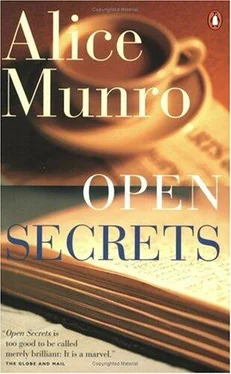One night, when Lottar served one man his food — a guest; there were always guests invited for meals around the low table, the sofra —she noticed what small hands he had, and hairless wrists. Yet he was not young, he was not a boy. A wrinkled, leathery face, without a mustache. She listened for his voice in the talk, and it seemed to her hoarse but womanish. But he smoked, he ate with the men, he carried a gun.
“Is that a man?” Lottar said to the woman serving with her. The woman shook her head, not willing to speak where the men might hear them. But the young girls who overheard the question were not so careful. “Is that a man? Is that a man?” they mimicked Lottar. “Oh, Lottar, you are so stupid! Don’t you know when you see a Virgin?”
So she did not ask them anything else. But the next time she saw the Franciscan, she ran after him to ask him her question. What is a Virgin? She had to run after him, because he did not stop and talk to her now as he had when she was sick in the little hut. She was always working when he came to the kula , and he could not spend much time with the women anyway — he sat with the men. She ran after him when she saw him leaving, striding down the path among the sumac trees, heading for the bare wooden church and the lean- to church house, where he lived.
He said it was a woman, but a woman who had become like a man. She did not want to marry, and she took an oath in front of witnesses that she never would, and then she put on men’s clothes and had her own gun, and her horse if she could afford one, and she lived as she liked. Usually she was poor, she had no woman to work for her. But nobody troubled her, and she could eat at the sofra with the men.
Lottar no longer spoke to the priest about going to Skodra. She understood now that it must be a long way away. Sometimes she asked if he had heard anything, if anybody was looking for her, and he would say, sternly, no one. When she thought of how she had been during those first weeks — giving orders, speaking English without embarrassment, sure that her special case merited attention — she was ashamed at how little she had understood. And the longer she stayed at the kula , the better she spoke the language and became accustomed to the work, the stranger was the thought of leaving. Someday she must go, but how could it be now? How could she leave in the middle of the tobacco-picking or the sumac harvest, or during the preparations for the feast of the Translation of St. Nicholas?
In the tobacco fields they took off their jerkins and blouses and worked half naked in the sun, hidden between the rows of tall plants. The tobacco juice was black and sticky, like molasses, and it ran down their arms and was smeared over their breasts. At dusk they went down to the river and scrubbed themselves clean. They splashed in the cold water, girls and big, broad women together. They tried to push each other off balance, and Lottar heard her name cried then, in warning and triumph, without contempt, like any other name: “Lottar, watch out! Lottar!”
They told her things. They told her that children died here because of the Striga . Even grown-up people shrivel and die sometimes, when the Striga has put her spell on them. The Striga looks like a normal woman, so you do not know who she is. She sucks blood. To catch her, you must lay a cross on the threshold of the church on Easter Sunday when everybody is inside. Then the woman who is the Striga cannot come out. Or you can follow the woman you suspect, and you may see her vomit up the blood. If you can manage to scrape up some of this blood on a silver coin, and carry that coin with you, no Striga can touch you, ever.
Hair cut at the time of the full moon will turn white.
If you have pains in your limbs, cut some hair from your head and your armpits and burn it — then the pains will go away.
The oras are the devils that come out at night and flash false lights to bewilder travellers. You must crouch down and cover your head, else they will lead you over a cliff. Also they will catch the horses and ride them to death.
The tobacco had been harvested, the sheep brought down from the slopes, animals and humans shut up in the kula through the weeks of snow and cold rain, and one day, in the early warmth of the spring sun, the women brought Lottar to a chair on the veranda. There, with great ceremony and delight, they shaved off the hair above her forehead. Then they combed some black, bubbling dye through the hair that remained. The dye was greasy — the hair became so stiff that they could shape it into wings and buns as firm as blood puddings. Everybody thronged about, criticizing and admiring. They put flour on her face and dressed her up in clothes they had pulled out of one of the great carved chests. What for, she asked, as she found herself disappearing into a white blouse with gold embroidery, a red bodice with fringed epaulets, a sash of striped silk a yard wide and a dozen yards long, a black-and-red wool skirt, with chain after chain of false gold being thrown over her hair and around her neck. For beauty, they said. And they said when they had finished, “See! She is beautiful!” Those who said it seemed triumphant, challenging others who must have doubted that the transformation could be made. They squeezed the muscles in her arms, which she had got from hoeing and wood-carrying, and patted her broad, floured forehead. Then they shrieked, because they had forgotten a very important thing — the black paint that joins the eyebrows in a single line over the nose.
“The priest is coming!” shouted one of the girls, who must have been placed as a lookout, and the woman who was painting the black line said, “Ha, he will not stop it!” But the others drew aside.
The Franciscan shot off a couple of blanks, as he always did to announce his arrival, and the men of the house fired off blanks also, to welcome him. But he did not stay with the men this time. He climbed at once to the veranda, calling, “Shame! Shame! Shame on you all! Shame!
“I know what you have dyed her hair for,” he said to the women. “I know why you have put bride’s clothes on her. All for a pig of a Muslim!
“You! You sitting there in your paint,” he said to Lottar. “Don’t you know what it is for? Don’t you know they have sold you to a Muslim? He is coming from Vuthaj. He will be here by dark!”
“So what of it?” said one of the women boldly. “All they could get for her was three napoleons. She has to marry somebody.”
The Franciscan told her to hold her tongue. “Is this what you want?” he said to Lottar. “To marry an infidel and go to live with him in Vuthaj?”
Lottar said no. She felt as if she could hardly move or open her mouth, under the weight of her greased hair and her finery. Under this weight she struggled as you do to rouse yourself to a danger, out of sleep. The idea of marrying the Muslim was still too distant to be the danger — what she understood was that she would be separated from the priest, and would never be able to claim an explanation from him again.
“Did you know you were being married?” he asked her. “Is it something you want, to be married?”
No, she said. No. And the Franciscan clapped his hands. “Take off that gold trash!” he said. “Take those clothes off her! I am going to make her a Virgin!
“If you become a Virgin, it will be all right,” he said to her. “The Muslim will not have to shoot anybody. But you must swear you will never go with a man. You must swear in front of witnesses. Per quri e per kruch . By the stone and by the Cross. Do you understand that? I am not going to let them marry you to a Muslim, but I do not want more shooting to start on this land.”
Читать дальше












